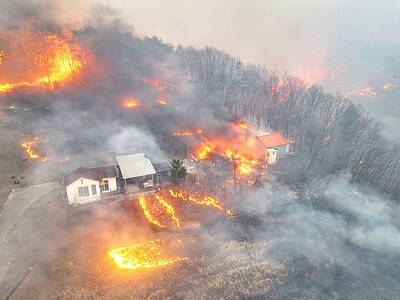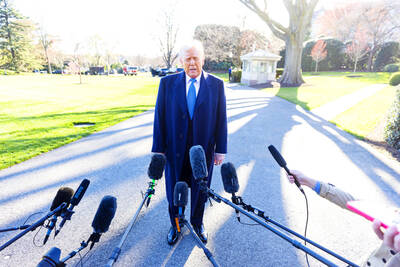Nepal's King Gyanendra yesterday announced municipal elections to "activate the democratic process" following strong international criticism of his seizure of power over two months ago.
"In view of the improving law and order situation [since the royal takeover], there should not be any delay in activating the democratic process," Gyanendra said in a speech that marked the Nepali New Year.
"We have, therefore, commanded the election commission to conduct municipal elections," he said in a state radio address.
Emergency rule
The speech was Gyanendra's first nationwide address since he fired the government and imposed emergency rule on Feb. 1 to combat a growing Maoist insurgency in the poverty-stricken country.
The king, who has pledged to restore democracy within three years, said he had ordered municipal elections in the country's 58 municipalities before mid-April next year.
The Nepali calendar year runs from mid-April to mid-April.
Pressure
Gyanendra has been under heavy international pressure to re-establish democracy. India and Britain have suspended military aid and the US has threatened to follow suit.
Opposition critics said the king was playing political games with his promise of municipal polls.
"We do not support him in any of his political games," said Jhala Nath Khanal, a senior leader of the Nepal Communist Party-United Marxist and Leninist, which belonged to the sacked coalition government.
"Calling for local elections without holding parliamentary elections is meaningless," said Tribhuvan University professor Kapil Shrestha.
Cosmetic facade
The polls "will be seen as a cosmetic facade to camouflage the lack of democracy," he said.
The king said in his speech that "everyone has experienced a steady improvement in the law and order situation" since emergency rule was imposed.
Troops and police have since 1996 been battling an increasingly deadly Maoist revolt aimed at toppling the king and installing a communist republic.
The conflict has claimed over 11,000 lives.
There has been no let-up in fighting since Gyanendra assumed absolute power and analysts say the army is ill-equipped to combat the Maoists who hold sway in many rural areas.
Yesterday the royal army announced the Maoist rebel death toll from a battle in Maoist-dominated western Nepal last week had hit 166 with the discovery of 18 more bodies.
There has been no comment from the rebels on the clash, believed to be the deadliest since Gyanendra took power.

DEATH CONSTANTLY LOOMING: Decades of detention took a major toll on Iwao Hakamada’s mental health, his lawyers describing him as ‘living in a world of fantasy’ A Japanese man wrongly convicted of murder who was the world’s longest-serving death row inmate has been awarded US$1.44 million in compensation, an official said yesterday. The payout represents ¥12,500 (US$83) for each day of the more than four decades that Iwao Hakamada spent in detention, most of it on death row when each day could have been his last. It is a record for compensation of this kind, Japanese media said. The former boxer, now 89, was exonerated last year of a 1966 quadruple murder after a tireless campaign by his sister and others. The case sparked scrutiny of the justice system in

DITCH TACTICS: Kenyan officers were on their way to rescue Haitian police stuck in a ditch suspected to have been deliberately dug by Haitian gang members A Kenyan policeman deployed in Haiti has gone missing after violent gangs attacked a group of officers on a rescue mission, a UN-backed multinational security mission said in a statement yesterday. The Kenyan officers on Tuesday were on their way to rescue Haitian police stuck in a ditch “suspected to have been deliberately dug by gangs,” the statement said, adding that “specialized teams have been deployed” to search for the missing officer. Local media outlets in Haiti reported that the officer had been killed and videos of a lifeless man clothed in Kenyan uniform were shared on social media. Gang violence has left

‘HUMAN NEGLIGENCE’: The fire is believed to have been caused by someone who was visiting an ancestral grave and accidentally started the blaze, the acting president said Deadly wildfires in South Korea worsened overnight, officials said yesterday, as dry, windy weather hampered efforts to contain one of the nation’s worst-ever fire outbreaks. More than a dozen different blazes broke out over the weekend, with Acting South Korean Interior and Safety Minister Ko Ki-dong reporting thousands of hectares burned and four people killed. “The wildfires have so far affected about 14,694 hectares, with damage continuing to grow,” Ko said. The extent of damage would make the fires collectively the third-largest in South Korea’s history. The largest was an April 2000 blaze that scorched 23,913 hectares across the east coast. More than 3,000

‘INCREDIBLY TROUBLESOME’: Hours after a judge questioned the legality of invoking a wartime power to deport immigrants, the president denied signing the proclamation The US on Friday said it was terminating the legal status of hundreds of thousands of immigrants, giving them weeks to leave the country. US President Donald Trump has pledged to carry out the largest deportation campaign in US history and curb immigration, mainly from Latin American nations. The order affects about 532,000 Cubans, Haitians, Nicaraguans and Venezuelans who came to the US under a scheme launched in October 2022 by Trump’s predecessor, Joe Biden, and expanded in January the following year. They would lose their legal protection 30 days after the US Department of Homeland Security’s order is published in the Federal